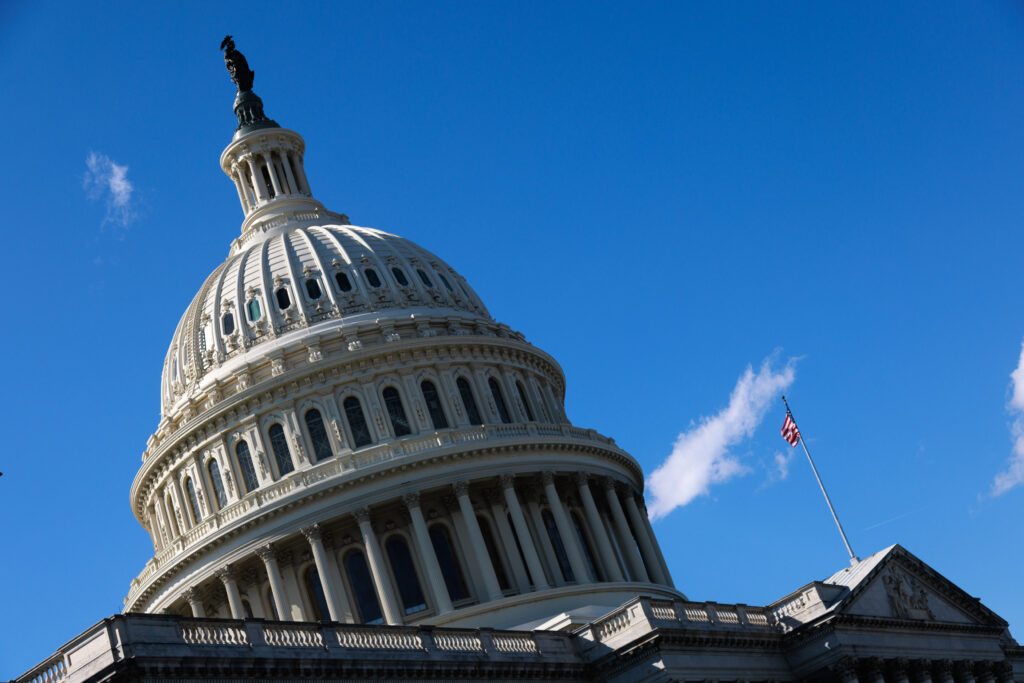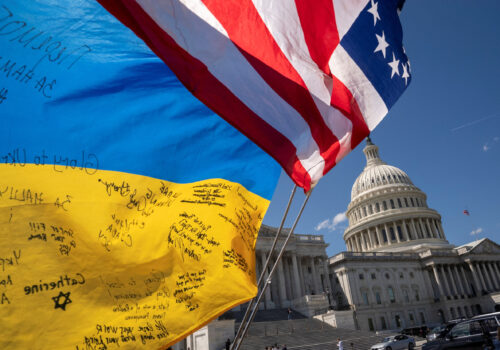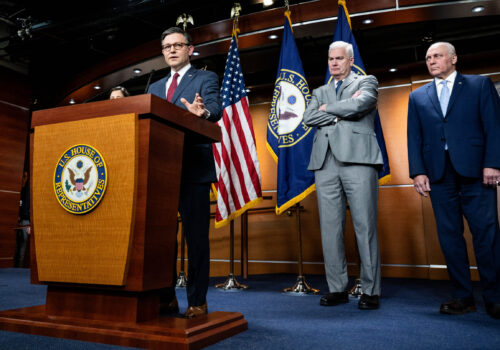There’s a reason I call this column Inflection Points. Sometimes these historical hinge moments come in bunches. We may be experiencing one of those times, as the last few days have brought new hope to Europe and the Middle East, not least because of US leadership on both fronts.
Let’s start with Saturday’s vote in the US House of Representatives, passing a sweeping ninety-five-billion-dollar package to aid allies and partners—most importantly, in my view, Ukraine. The vote demonstrated continued US leadership at a moment when the world is facing the greatest threats to global order since the 1930s.
Most crucial was House Speaker Mike Johnson’s gamble, with his right flank threatening to oust him, in bringing the package to the floor with Democratic support. The Senate will consider the measures early this week, and President Joe Biden is expected to sign the bill, but it’s Johnson’s shift that has been the most striking.
“The speaker’s torturous path to embracing Ukraine aid is the result of many factors,” write the Washington Post’s Leigh Ann Caldwell and Marianna Sotomayor in a fascinating Sunday report on “The evolution of Mike Johnson on Ukraine.” It included, they explain, “high-level intelligence briefings as a House leader, his faith, the counsel of three committee chairs named Mike, and a realization that the GOP would never unite on Ukraine.”
One might breeze past faith on that list, but that would be a mistake. Johnson’s awareness of Russia’s widespread persecution of Protestants in occupied Ukraine must have had a powerful influence. Ukrainian evangelical pastor Pavlo Unguryan met with the speaker recently, and as word of Russia’s actions spread, some American evangelicals called on the House to act.
The reporters go on to quote an emotional Johnson, responding last week to a question from the Washington Post at a press conference: “Look, history judges us for what we do. This is a critical time right now, critical time on the world stage. I could make a selfish decision and do something that’s different, but I’m doing here what I believe to be the right thing.”
Johnson did do the right thing, and to do so he had to rely on unanimous Democratic backing against opposition from just over half (112, precisely) of his Republican colleagues. History will thank him. Some of his short-sighted colleagues will not. One way or the other, he has avoided what I warned last week could be “geopolitical malpractice.”
Now it’s time for the United States to take the lead alongside allies in ensuring Ukraine’s territorial integrity, democracy, and security, up to and including a concrete path to NATO membership.
On the Middle East, it’s worth going back to my Inflection Points column on November 18 of last year, less than six weeks after Hamas’s terrorist attack on Israel. I wrote: “There’s an immediate need for moderate, modernizing Arab countries and Israel to quietly begin laying the groundwork for a NATO-like collective security organization and a European Union-like economic body. These institutions would unlock the region’s potential by countering its relentless cycles of violence.”
On that score, the region came a step closer last week, as you’ll gather from reading the brilliant analysis and reporting by the Washington Post’s David Ignatius under the headline, “The unspoken story of why Israel didn’t clobber Iran.”
Writes Ignatius, “In its measured response, [Israel] appeared to be weighing the interest of its allies in this coalition—Saudi Arabia, the United Arab Emirates, Jordan—which all provided quiet help in last weekend’s shoot-down. It’s playing the long game, in other words.”
Here the United States has been crucial, using the leverage that only it has to push for normalization between Israel and Saudi Arabia, an aim that Hamas intentionally targeted with its October 7 attack. On Friday, the Wall Street Journal reported that the Biden administration is now making a fresh push toward a deal, under which the Israelis would accept a new commitment to Palestinian statehood in exchange for Saudi normalization.
What would Saudi Arabia get? A more robust defense and security relationship with the United States, assistance in acquiring civil nuclear power, and new momentum toward a Palestinian state, which are, again, matters only Washington can provide. The package is “in the final stages of negotiating,” according to the Wall Street Journal reporters.
This course of action recognizes that the best way to defeat Iran over time is to solidify the cooperation of the countries its extremism and proxies threaten, much as the Soviet Union was contained by a coalition of like-minded countries that provided better outcomes for their people.
One week of good news doesn’t add up to a strategic shift, either in Europe or the Middle East. Yet the past week provides the opportunity for a momentum shift in both theaters that the United States and its partners should seize.
Frederick Kempe is president and chief executive officer of the Atlantic Council. You can follow him on Twitter: @FredKempe.
This edition is part of Frederick Kempe’s Inflection Points Today newsletter, a column of quick-hit insights on a world in transition. To receive this newsletter throughout the week, sign up here.
Further reading
Sat, Apr 20, 2024
Renewed US assistance opens a path to success, if Ukraine’s friends move fast
New Atlanticist By Daniel Fried
The delay in US aid was deadly for Ukraine and damaging to US credibility. Now that aid is likely on its way, what's needed next to help Ukraine fend off an expected Russian land offensive?
Sun, Apr 21, 2024
‘A bad day for Putin’: US aid vote gives Ukrainians renewed hope
UkraineAlert By Peter Dickinson
Ukrainians let out a collective sigh of relief on Saturday as the US House of Representatives passed a long-delayed $61 billion aid bill that will provide Ukraine with a crucial lifeline in the struggle against Russian aggression, writes Peter Dickinson.
Thu, Apr 18, 2024
Your primer on the US House security bills for Ukraine, Israel, the Indo-Pacific, and more
Experts react By
Our experts share their insights on what’s in the pending legislation and why it matters for US national security.
Image: The dome of the U.S. Capitol is seen in Washington, D.C. on March 20, 2024. (Photo by Bryan Olin Dozier/NurPhoto)



